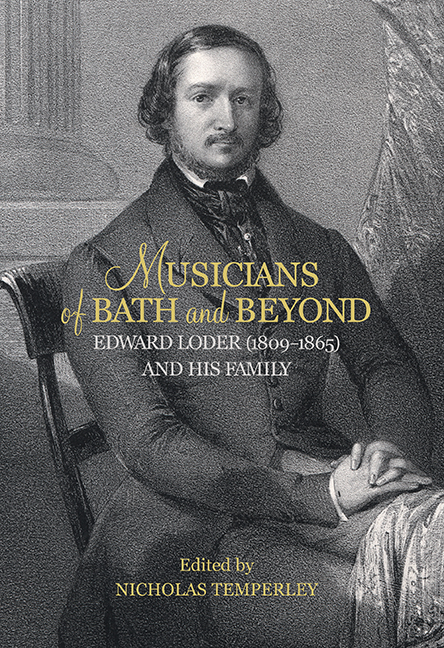Book contents
- Frontmatter
- Contents
- List of Illustrations
- Acknowledgments
- Notes on Contributors
- The Loder Family Tree
- Abbreviations
- Introduction
- PART ONE The Musical Profession in Early Nineteenth-Century England
- PART TWO The Loder Family
- PART THREE The Music of Edward Loder
- EPILOGUE The 1966 Revival of Raymond and Agnes
- Select Bibliography
- Index of Edward Loder’s compositions
- General Index
- Miscellaneous Endmatter
5 - Loder & Sons, Bath: A Band of Musicians
Published online by Cambridge University Press: 04 June 2021
- Frontmatter
- Contents
- List of Illustrations
- Acknowledgments
- Notes on Contributors
- The Loder Family Tree
- Abbreviations
- Introduction
- PART ONE The Musical Profession in Early Nineteenth-Century England
- PART TWO The Loder Family
- PART THREE The Music of Edward Loder
- EPILOGUE The 1966 Revival of Raymond and Agnes
- Select Bibliography
- Index of Edward Loder’s compositions
- General Index
- Miscellaneous Endmatter
Summary
WHETHER for Lydia Melford in Tobias Smollett's The Expedition of Humphry Clinker (1771) or for Anne Elliot in Jane Austen's Persuasion (1816), there is no doubt that part of the allure of the concert room in eighteenth-century Bath was that it was a place for watching as well as listening. Lydia writes of music being played in the pump room every morning and describes how the ‘eye is continually entertained with the splendour of dress and equipage’, while Anne, upon attending a benefit concert, is as much concerned with the whereabouts of Captain Wentworth as with the programme itself. While the rules of etiquette were breaking down following the death of Beau Nash in 1762, music continued to engage the city's inhabitants long after the leaders of polite society had abandoned the city. David Jeremy argues that the social decline of Bath during the following century can be attributed to three factors: royal neglect, the vogue for domestic travel, and an interest in the Continent following the defeat of Napoleon in 1815.1 But there is a counter-argument, which says that as the population became less genteel, opportunities opened up for the middle classes, and improvements in mobility ensured the continuing attraction of both national and international musicians to the city.
There is a case that the decline might have been more rapid but for one family whose commitment to the city continued through the late Georgian period into the reign of Queen Victoria. That family, the Loders, epitomised the rise of the middle class. More than a dozen of its members actively engaged in the musical life of the city of Bath: some in a leading role, others in a collaborative one. Individually their skills covered much of the musical realm: a range of instruments and genres, as well as teaching, composing, and the music business. Several combined artistic flair with commercial realism. All took advantage of the rapid developments in communication. As a family they encouraged and supported one another: in particular, the prominent violinist John David Loder provided the connections that allowed others to launch their careers. Some left the city for their education only to return for several years, as did Edward James and Kate Fanny Loder, before establishing careers in the metropolis.
- Type
- Chapter
- Information
- Publisher: Boydell & BrewerPrint publication year: 2016

